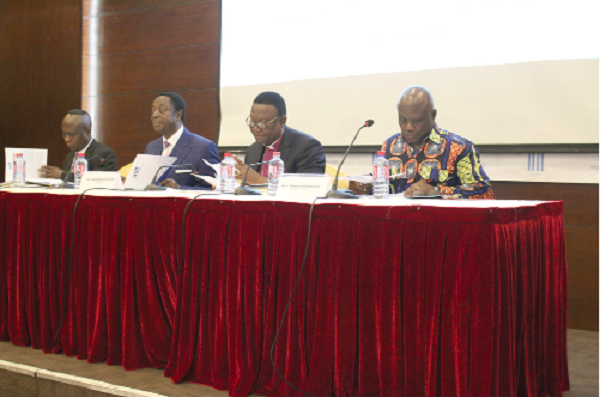
IFS pushes for audit of public debt-Advocates independent commission
The Institute of Fiscal Studies (IFS) has called for an independent Debt Audit Commission to undertake public debt audit in a bid to reduce the country’s rising debt stock.
It said the commission should be made up of domestic and international experts who would have access to all the information needed to undertake the audit, as well as analyse all the terms of loans and their costs and benefits.
At a forum organised by the institute on the theme: ‘Ghana’s growing public debt and its implications for the economy,’ the Executive Director of IFS, Professor Newman Kusi, said the commission, when established, should also be made to propose new accountability mechanisms for the government and lenders to ensure that loans contracted were productively utilised.
Domestic revenue mobilisation
To reverse the country’s debt dynamic, the executive director also stressed the need to strengthen domestic revenue mobilisation by increasing tax revenues from large companies and rich individuals, as well as cease granting tax waivers.
He said reversing the country’s debt dynamics would require a credible and sustained fiscal consolidation underpinned by strong revenue mobilisation and prioritisation of government expenditure in favour of capital and social spending.
“Paying serious attention to revenue mobilisation should, therefore, be the number one priority of the government. A revenue mobilisation strategy that seeks to strengthen revenue administration, improve tax compliance, help combat abuses and corruption, and increase the fiscal space for public investment and social spending is what is urgently needed,” he noted.
“There is the need for a strong revenue mobilisation effort, including a broadening of the revenue base to include the informal sector, reviewing the extractive industry fiscal regime, removing exemptions and plugging leakages, and strengthening the machinery for tax collection and administration,” he added.
Deepening the domestic debt market
Prof. Kusi also pointed out the need to deepen the domestic debt market.
“While the government’s debt re-profiling initiative aimed at extending the maturity period of some short-term debts and maintaining a prudent degree of risk is commendable, one should not lose sight of the associated debt servicing costs,” he stated.
“At the end of the day, the crucial factor is the cost of servicing the debt (interest payments) over the maturity period, which may not necessarily be cost effective,” he added.
He said ongoing efforts to improve debt management and deepen the domestic debt market should, therefore, be supported by improved cash management to better align primary market operations with cash flow needs.
Ghana’s public debt
Sharing an insight into the country’s debt position, Prof. Kusi said the situation had seriously worsened in recent years and the country now faced a high risk of debt distress and increased overall debt vulnerability.
He revealed that total public debt-GDP ratio dropped sharply from 113.1 per cent in 2000 to 26.2 per cent in 2006, driven by Heavily Indebted Poor Countries (HIPC) and Multilateral Debt Relief Initiative (MDRI) reliefs.
By end 2016, he said the debt-GDP ratio had risen again to 73.3 per cent, and moving towards the ratios recorded in the pre-HIPC period.
“As a result, total public debt service-to-revenue ratio (including payments on external and domestic debt) has not only assumed a rapidly increasing path but has breached its indicative long-term threshold,” he mentioned.
“Debt service now absorbs a large part of domestic revenue, leaving the country vulnerable to shocks. The country has fallen into a debt trap as real interest rates continue to surpass GDP growth rates, which has forced the country to continue committing more of its tax revenue to service debts,” he explained.
He indicated that the country’s rising public debt was already placing a significant burden on the economy and society, and the country was at risk of falling back into an extended debt trap, with economic stagnation and possible increases in poverty rates.
How the country got there
Touching on how the country found itself in such a situation, Prof. Kusi said some of the factors included the oil discovery in the country and the volatility in commodity prices.
“In early 2013, the price of gold fell significantly, as did the price of oil from the start of 2014. More money was, therefore, borrowed following the fall in the price of oil and other commodities to deal with the impact of the commodity price crash while the relative size of the debt also grew because of the fall in the value of the cedi against the dollar,” he explained.
“At the same time, the rapid economic growth in the 2010-2013 period, driven by the coming on stream of oil production in the country, led to an increased willingness and desire of various institutions to lend to the country, with a corresponding willingness to borrow,” he noted.
He also pointed out the country’s access to the international capital market as another factor that had led to increased borrowing.
“More recently, Ghana’s access to the international capital market and the choice of currency and maturity structures of its external borrowings seem to have been driven by the desire to reap immediate fiscal benefits of borrowing in a currency with low coupon rates,” he stated.
“Such debt strategies underestimate the risks associated with unhedged foreign currency borrowing for a number of reasons,” he added.